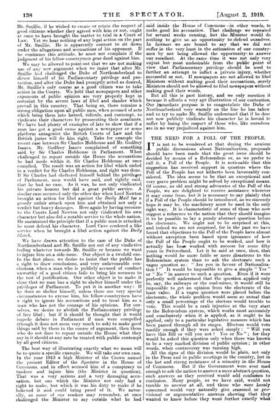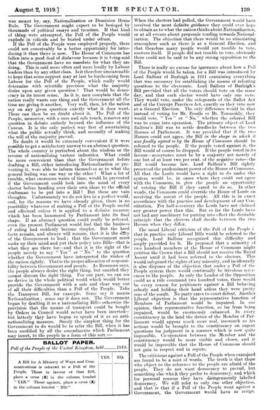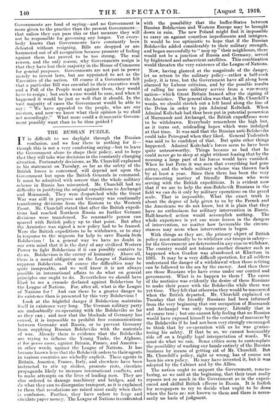THE NEED FOR A POLL OF THE PEOPLE.
IT is not to be wondered at that during the anxious public discussions about Nationalization, proposals should have been made that the great issue should be decided by means of a Referendum or, as we prefer to call it, a Poll of the People. It is noticeable that, this suggestion has received support in quarters where the Poll of the People has not hitherto been favourably con- sidered. The idea seems to be that an exceptional -and very grave problem might be solved by exceptional means. Of course, as old and strong advocates of the Poll of the People, we are delighted to receive .assistance wherever it may come from, but it is necessary to say plainly that if a Poll of the People should be introduced, as we sincerely hope it may• be, the machinery must be used in the only right way. It is characteristic of some of those who now suggest a-reference to the nation that they should imagine it to be possible to lay a purely .abstract question before the electorate. We ought not to be surprised at this, and indeed we are not surprised, for in the past we have found that objections to the Poll of the People have almost without exception been based upon ignorance of how the Poll of the People ought to be worked, and how it actually has been worked with success for some fifty years in Switzerland. Let it be said at once, then, that nothing would be more futile or more disastrous to the Referendum system than to ask the electorate such a vague question as : " Are you in favour of Nationaliza- tion ? It would. be impossible to give a simple " Yes " or " No " in answer to such .a question. Even if it were perfectly well understood that the question ,applied only to, say, the railways or -the coal-mines, -it would still be impossible to _get an opinion from the electorate of the least value. If a vague question were placed before the Alectorate,, the whole problem would seem so unreal that only a small percentage of the electors would trouble to vote. This would be a rank injustice at the very start to the Referendum system, -which works most accurately and conclusively when it is applied, as it ought to •be applied, only to a particular legislative measure which• has been passed through all its stages. Electors would vote readily enough if they were asked : " Will you have this Bill or will you not ? Yes or No " ; for they would be asked this question only when there was known to be a very marked division of public opitdoxl ; in other words, when controversy was running high. All the signs of this division would be plain, not only in the Press and in public meetings in the country, hut in the hot and strong resistance of a minolity, in the .House of Commons. But if the Government were. ever mad enough to ask the nation to answer a mere abstract queation, such .answers as they received would add eigihkeien to confusion. Many people, as we have said, would not trouble to answer at .all, and those who _were keenly concerned would very naturally give reasoned or pro- visional or argumentative answers showing that they wanted to know before they went further exactly what was meant by, say, Nationalization or Dominion Home Rule. The Government might expect to be besieged by thousands of political essays and treatises. If that kind of thing. were attempted, the Poll of the People would, explode. in ridicule and be buried under odium.
If the Poll of the People were employed properly, there could not conceivably be a better opportunity for intro- ducing it than thereis now. The House of Commons has fallen into a good deal of disfavour because it is being said that the Government have no mandate for what they are doing. This is said more often and more loudly by Labour leaders than by any other class. Is it therefore unreasonable to hope that some support may at last be forthcoming from Labour for the Poll of the People, which really would determine with scientific precision what the majority desire upon any given question ? That would be demo- cracy in its truest sense. ABA is, men complain that the nation really wants one thing and the Government all the time are giving• it another. Very well, then, let the nation say on any given question exactly what it does want. There can then be no doubt about it. The Poll of the People; moreover, with a sure and safe touch, removes any question in debate entirely beyond the influence of the Caucus. It is the only perfect way first of ascertaining what the public actually think, and secondly of making the will of the majority prevail. No doubt it would be extremely convenient if it were possible to get a satisfactory answer to an abstract question. The whole country is perturbed about the wisdom or the reverse of nationalizing various industries. What could be more convenient than that the Government before drafting a Bill, either introducing Nationalization or pre- venting it, were able to inform themselves as to what the general feeling. was one way or the other ! What a lot of trouble, what enormous waste of time, would be prevented if the Government could look into the mind of every elector before handing over their own ideas to the official draftsman to be put into a Bill ! But these are vain thoughts. Unfortunately we do not live in a perfect world, and, for the reasons we have already given, there is no possibility whatever of making a Poll of the People useful and effectual unless it is applied to a definite measure which has been hammered by Parliament into its final shape. If an abstract question could really be referred, even the present Parliament would. find that the business of ruling had suddenly become simpler. But the hard facts remain, and always will remain, that it is the d.Cty of the Government to lead ; that the Government must make up their mind and put their policy into Bills—that is what they are there for—and that it is the right of the people merely to say " Yes " or " No " to the question whether the Government have interpreted the wishes of the nation rightly. Thetis the proper allocation of responsi- bility between Government and people. As Rousseau says, the people always desire the right thing, but unaided they cannot discern the right thing. For our part, we can see no device in the whole political world which would better provide the Government with a safe and clear way out of all their difficulties than a Poll of the People. Take the Transport Bill, for example. Some say it means Nationalization ; some say it does not. The Government began by drafting it as a nationalizing Bill—otherwise the provision that the means of transport could be bought by Orders in Council would never have been inserted— but latterly they have begun to speak of it as an anti- nationalizing measure. Surely the simplest thing for the Government to do would be to refer the Bill, when it has been modified by all the amendments which Parliament may insert, to the people in a form of this sort :—
BALLOT PAPER.
Poll of the People of the United Kingdom, held 1919.
A Bill for A Ministry of Ways and Com- ruunicatiOne is referred to a Poll of the People. Those in favour of that Bill, place, a cross (X) in the column headed
" YES."' Those against, place a' cross (X) in the column headed " NO."
YES. NO.
When the electors had polled, the Government would have received the most definite guidance they could ever hope to obtain as to what the nation thinks about Nationalization, or at all events about proposals tending towards National- ization. The objection. that there would be no stimulating atmosphere such as there is at a General Election, and that therefore many people would not trouble to vote, answers itself. If people did not trouble to vote, obviously there could not be said to be any strong opposition to the There is'really no excuse for ignorance about how a Poll of the People would be taken, for a Bill was introduced by Lord Balfour of Burleigh in 1911 containing everything that was necessary for establishing the means of referring questions to the electorate. Lord Balfour of Burleigh's Bill provided that all the voters should vote on the same day, and that each elector would have only one vote. They would vote; under the safeguards of the Ballot Act and of the Corrupt Practices Act, exactly as they vote now at a General Election. The only difference would be that instead of voting for Mr. Boodle or Mr. Tomnoddy, they would vote, " Yes " or " No," whether the referred Bill was to come into operation, The primary object of Lord Balfour's Bill was to settle deadlocks between the two Houses of Parliament. It was provided that if the two Houses could not agree, the Bill in the shape in which it was finally agreed to by the' House of Commons should be referred to the people. If the people voted against it, the Bill would of course be dropped. If the people voted ireits favour—acceptance must be by a majority not merely of one but of at least two per cent. of the negative vote—the Bill would become law. Lord Balfour's Bill rightly preserved the predominant power of the House of Commons. All that the Lords' would have a right to do under this system would be, in cases where they could not agree with the Commons, to give the people an opportunity of vetoing the Bill if they cared to do so. In other words, the Commons could override the House of Lords on receiving the assent of the people. All this is in exact accordance with the practice and development of our Con- stitution. For half-a-century the Lords have not claimed any greater power than this. But so far the Lords have not had any machinery for putting into effect the desirable principle that the electors shall decide between the two Houses when they differ.
The usual Liberal criticism of the Poll of the People i that in practice only Liberal Bills would be referred to the people. Lord Balfour recognized this difficulty and amply provided for it. He proposed that a minority of two hundred members of the House of Commons might petition the Crown that a Bill should not receive the Royal Assent until it had been referred to the electors: 'Ails would safeguard the rights of any minority, and incidentally it also disposes of the objection that under a Poll of the People system there would continually be frivolous refer- ences to the people. As only the Leader of the Opposition could as a rule command two hundred votes, there would be every reason for petitioners against a Bill behaving soberly and holding their hand unless they were pretty sure of the result. No party cares to court defeat. Another Liberal objection is that the representative function of Members of Parliament would be impaired. In our opinion, their representative function, so far from being impaired, would be enormously enhanced. In every constituency in the land the duties of the Member of Par- liament would appear much more real, inasmuch as his actions would be brought to the constituency on urgent questions for judgment in a manner which is now quite impossible. Co-operation between the Member and the constituency would be more visible and closer, and it would be impossible that the House of Commons should not gain in respect and in repute.
The criticisms against a Poll of the People when e ed are found to be a mist of words. The truth is that who object to the reference to the people are afraid of the people. They do not want democracy to prevail, but something else which they prefer to democracy, and which for personal reasons they have disingenuously labelled democracy. We will refer to only one other objection, and that is that if a Poll of the People went against a Government, the Government would have to resign. Governments are fond of saying—and no Government is more given to the practice than the present Government— that unless they can pass this or that measure they will not be responsible for governing any longer. Yet every- body knows that Governments have constantly been defeated without resigning. Bills are dropped or are hammered out of all recognition because pressure of feeling against them has proved to be too strong. The real reason, and the only reason, why Governments resign is that they have lost their majority in the House of Commons for general purposes. Governments are not put in power merely to invent laws, but are appointed to act as the Executive of the nation. Of course if a Government felt that a particular Bill was essential to their executive work and a Poll of the People went against them, they would have to resign ; but such a case would be rare, and when it happened it would be just as well that it should. In the vast majority of cases the Government would be able to say : " We have appealed to the people, who are our masters, and now•we know what their opinion is we shall act accordingly." What more could a democratic Govern- ment possibly want than to be thus guided ?




































 Previous page
Previous page